Dick Pope: Close Up With Humanity
As British film mourns a great of cinematography, the final feature he photographed is readied for cinema screens - and it's one that takes him, and us, home again
The news came a couple of weeks ago from the British Society of Cinematographers. Dick Pope, one of our most brilliant, emotionally-astute cinematographers - who in his remarkable partnership with director Mike Leigh, photographed everyday English families with not just realism but deep and moving integrity - was gone.
It seemed unthinkable then, when I began writing this, and seems unthinkable now, as I attempt once again (34th time lucky) to finish it. My rational mind repeating that at 77 he was closing out his eighth decade (scant solace for those who love him, I’m sure). And what a career! A calling. Still, there it is, again: that cognitive kick.
Maybe it’s because until that October day, his body of work was in forward motion, even full bloom. Pope made a film every year, every two, rarely a gap greater since the Noughties. And maybe because his latest Mike Leigh collaboration, the Marianne Jean-Baptiste-returning Hard Truths, hadn’t even made it to cinemas yet (it’s slated for release this upcoming January).
After the drama about a family buckling under a woman’s blind anger (“People - can’t stand ‘em. Cheerful grinning people…”) debuted at Toronto Film Festival, The Guardian’s Peter Bradshaw called it “a Mike Leigh classic” - and you wanna bet my pulse galloped (aided by the already-iconic “What’s a baby got pockets for?!”). We were off to the races, once again. Though it would heartbreakingly, only ever be once more (again).
Their creative relationship - what Leigh in a beautiful tribute to his dear friend and Director of Photography called “a marriage made in heaven” - began in 1990 with Life Is Sweet and spanned 34-years and nineteen projects (feature films, commercials and shorts). And with their final film, they returned to where I’ve always loved them most - with a glass to the wall of an English semi, a family the other side fucking about and falling to bits.
Inside the four-walls, Pope and Leigh created their own brand of magnified realism, building worlds around dinner tables, in the fingered-creases of a net curtain, where an arse-crack meets a settee. Stories, unbothered by strict narrative roles, unspooling through verging-on-outsize characters to lay out brutal and bittersweet truths about contemporary society and modern humanity. In short: what it is to be this human being stood on that bit of carpet right now.
Our shared humanity is what Dick Pope - and what he called his “quiet photography” and “under-the-table cinematography” made real in their ‘domestic’ films (oh, and I know why the d-word, but kill me). Granted whether it was a white-knuckling-it working-class family in the frame, or one lower-middle-class and dissatisfied. This didn’t always look pretty (don’t get me started on the current ‘it’s good because it looks dead pretty’ misunderstanding of cinematography), but it was always right, always great. Because Pope rejected billy-big-bollocks style and technique for billy-big-bollocks style and technique’s sake; ego-swelling formal beauty in a landscape that didn’t demand it. That demanded something else, something equally worthy of being committed to film. Something real.
Leigh and Pope both clearly believed that life’s hope, humour, hurt, horniness, disappointments, deceit, daftness, devastation and love were to be found right there, in the everyday details, in the mess and chaos. Pope’s camera moving amongst the elbows and edges, into the tightest and most-awkward of corners. Squatting in the front seat of a taxi, inside a deserted cafe, a dilapidated bathroom, the corner of a settee, up against the door of an outdoor bog. We peer round open doors, clamber up the stairs, tab-hang onto that phone call. It’s an intimacy we instinctively want to invade, and run from. That makes us not just see, but feel.
Pope’s skill at nailing place and person so precisely was likely honed in his early documentary work, then fed and fattened by Mike Leigh’s approach to fictional realism. Particularly, the way he found it, in the prep and production method Pope called his “conjuring up process”. The director extensively workshopping, improvising and rehearsing with his actors on location, creating the action in the moment. Then, said Leigh, “Dick and I would watch it together, and refine and define it, shot by shot, through the camera”. Not a storyboard in sight, but every shot worked out, worked through, character and story.
Simply, Dick Pope’s stylistic choices came from story first. The painterly, tactile look of Mr Turner, a summoning of spirit in the painter’s own colour palette (in the DP’s first whirl with digital, using antique lenses); Naked’s skeevy bruised capital located in the grain of a black and blue cityscape; Peterloo’s in the thick of it POV (Akira Kurosawa an influence for their first action-dalliance): dust rising, bodies of working men falling under the state’s thundering hooves.
Dick Pope, at his very best, didn’t just capture humanity, but aided in the creation of it. Proof? All or Nothing. Timothy Spall’s broken cabbie Phil and the “I feel like an old tree that ain’t got no water” scene. My god: the dignity, the respect shown by the camera as it sits with him and his missus, Penny (Lesley Manville). Who may be inches apart in their small front room, but really, many miles adrift. Somehow, inch by inch, miraculously, they’re pulled together, into the same shot. Phil still in his armchair, Penny at his knee as she kisses his hand: a gesture almost-unbearably full of compassion, igniting a flicker of hope. Then, a moment - just a moment - when Pope doesn’t make their surroundings dissolve but seem brighter, richer, more real somehow. The frame filling with romance, with emotion, their faces cracked open with joy.
Kitchen sink? Now, you didn’t come here for my ‘Not All Filmmaking About the English Working-Class is Kitchen Sink’ talk, but suffice to say, I think Mike Leigh’s description of their work - as an “ongoing serious investigation into pushing the boundaries of cinematic heightened realism” - is a far more accurate description of the quietly radical and loudly empathetic films they made. And this investigation into humanity endured film on film, with Leigh explaining five years ago, why he worked exclusively with the cinematographer: “A violinist who owns a Stradivarius is not going to arbitrarily use another fiddle. That is the tool and you can play anything with it”. And play owt they did.
Life is Sweet (1990), that first glass to the wall, a (hilarious) masterpiece of poignancy; Naked (1993), David Thewlis’ tour de force as nihilistic misogynistic arsehole Johnny, on his “Dickensian journey through the underworld” at the fag-end of Thatcher; Secrets & Lies (1996), the Palme d’Or-winning, Marianne Jean-Baptiste-starring classic about an optometrist kindling a relationship with her emotionally-chaotic birth mother (Brenda Blethyn); Career Girls (1997), the infuriatingly-unappreciated, painfully-observed drama spinning around the ferocious Katrin Cartlidge (for which Pope photographed the past and present in 16mm handheld, and 35mm shot formally); Topsy Turvy (1999), their joyful period piece celebrating London theatre via the birth of Gilbert & Sullivan’s ‘The Mikado’; All or Nothing (2002), that exquisite portrait of family life on a council estate over a long weekend and, for my money, Timothy Spall’s greatest Mike Leigh performance (also, for a bonus point, his son is played by a baby James Corden); Mr Turner (2014), the lush story of the painter JMW Turner’s final 25 years in love and life; Peterloo (2018), their big and ballsy three-hour epic re-telling of the 1819 massacre in Manchester…
But it wasn’t just Mike Leigh who wanted to own a Stradivarius, of course. And Pope - between their films - lensed films for Richard Linklater (Me and Orson Welles), Gurinder Chadha (Angus, Thongs and Perfect Snogging), Edward Norton (Motherless Brooklyn), Neil Burger (The Illusionist), Christopher McQuarrie (Way of the Gun) and Chiwetel Ejiofor (The Boy Who Harnessed the Wind). My own personal cinema dreams were of Dick Pope and Shane Meadows, Dick Pope and Frances Lee, Clio Barnard, Lynne Ramsay, and Luna Carmoon.
His photography has long carried its own fingerprint. Supernova, Harry MacQueen’s underrated early-onset dementia drama with Colin Firth and Stanley Tucci (I know!) as a couple (I know, I know!) navigating looming-loss while camper-vanning around the Lake District, was soaked through with him. The DP’s emotional register and moderation setting the pace from the opening shot: one man’s hand sitting upon another’s. Literally nowt else happens. And it’s devastating. It’s a film that also serves as the DP’s love letter to light.
Because this was a man who knew how to locate the heart of a character, the truth of the story, in both the darkness, and particularly the light (Pope lit his films himself, in addition to laying hands on the cameras). It creeps up onto the rooftops of London as it wakes, in the aftermath; softly diffuses across Turner’s width as he paints; flickers and dissolves as an illusion is attempted; casts vulnerability across a man’s profile as he’s cradled by his lover. Pope sought out, coaxed the light into frame. A master of naturalism by way of amplification, replacement and restraint.
At some point during my 34 goes at finishing this, I read that JMW Turner’s final words were: “The Sun is God”. I can’t help but think that this is a sentiment Dick Pope, as a man who wrangled light - and life - with such class, would have shared.
He will be missed more than I think we yet know.

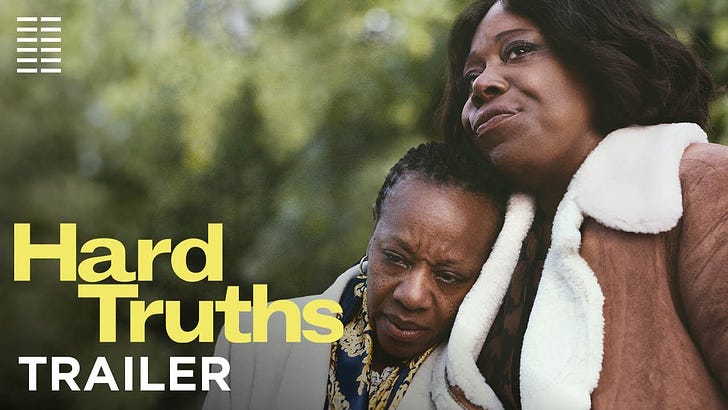

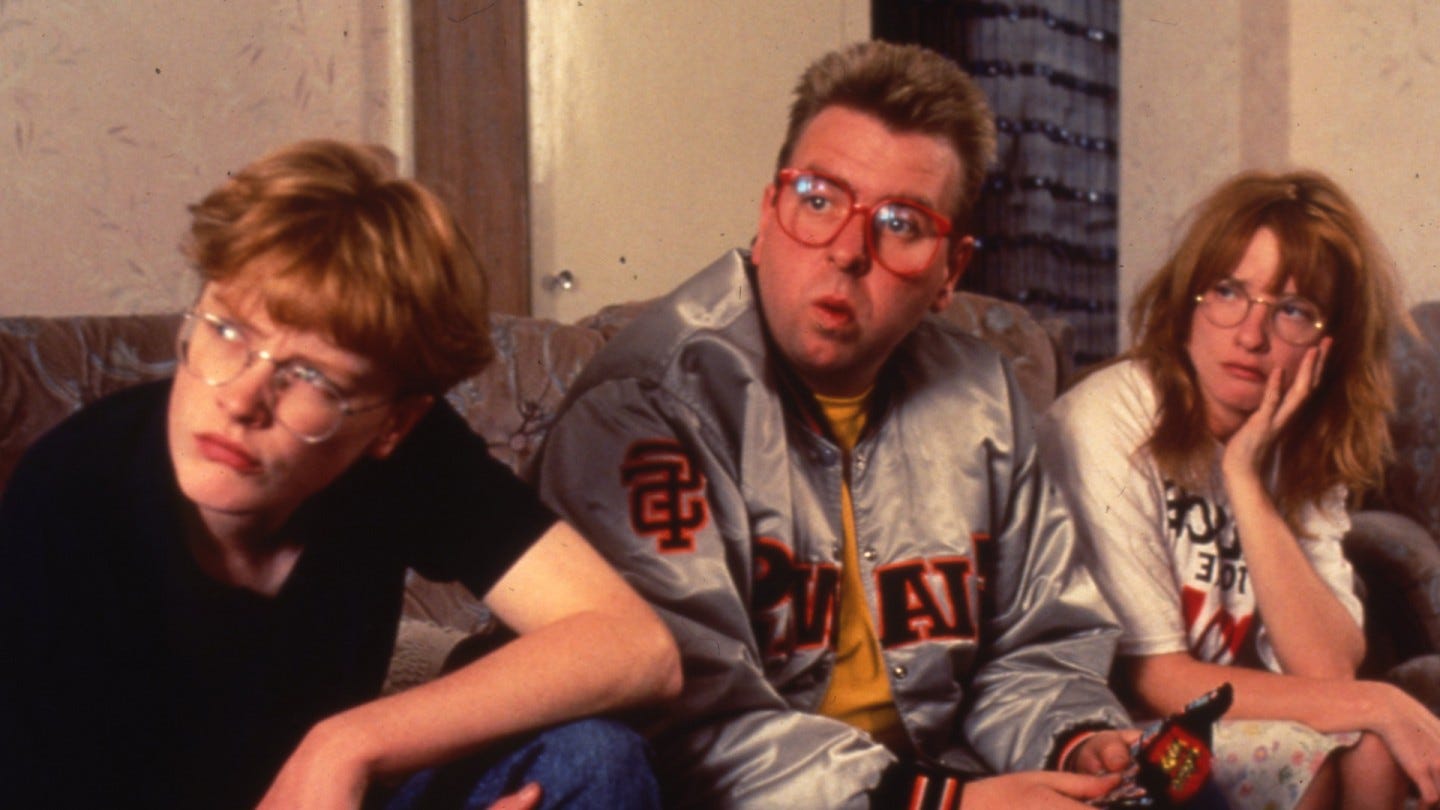
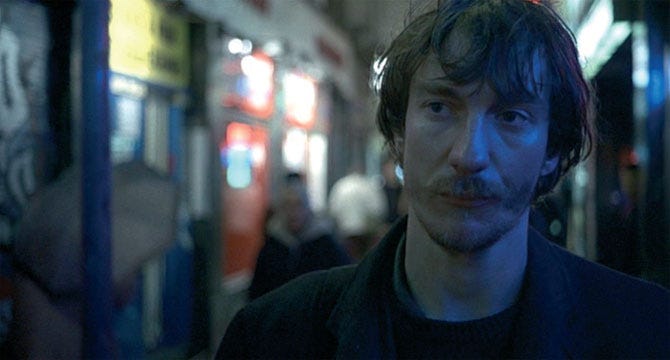
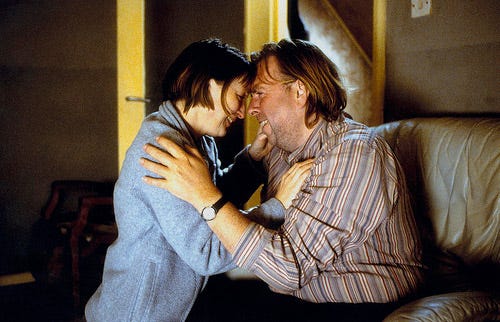
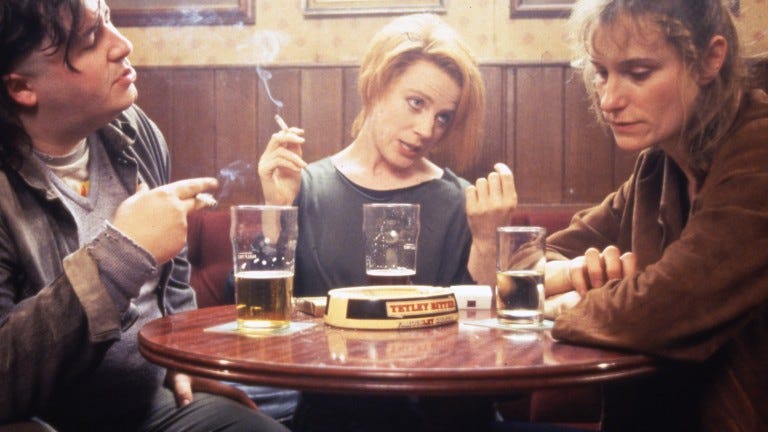

This is such a beautiful tribute to both Dick Pope and Mike Leigh - thank you! I didn't know about them before this (!!), but now I'm planning on watching all these films. When the focus is on 'real' - as in 'human life as most of us know it' - and on 'feelings' - as in 'all the good, bad, crazy, angry, loving and vulnerable emotions' that make up our days...I am there!! I like and need good, escapist fare to chill out many days, but work like what you describe here enriches my life.